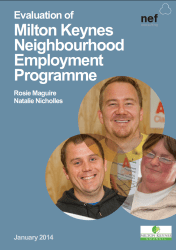 Statistics on unemployment are never far from newspaper headlines; the number of people out of work, the number of people on benefits, the success (or otherwise) of government programmes, the type of people on benefits. We know from the news what isn’t working, and who isn’t working but outside of very specific publications, the conversation is often focused more on the high level numbers than on how to support people back to sustainable work.
Statistics on unemployment are never far from newspaper headlines; the number of people out of work, the number of people on benefits, the success (or otherwise) of government programmes, the type of people on benefits. We know from the news what isn’t working, and who isn’t working but outside of very specific publications, the conversation is often focused more on the high level numbers than on how to support people back to sustainable work.
The welfare-to-work sector has changed radically in the last decade, most notably with the introduction of the Work Programme in 2010. Programmes across a range of funders have moved from small contracts on a local level to much larger contracts covering bigger areas with one main contractor managing a supply chain of smaller providers. Payment by results rewards employment support and training providers for moving people into sustainable work, as defined by remaining in work for a set period of time (usually between 6 and 24 months).
Our year-long evaluation of the Milton Keynes’ Neighbourhood Employment Programme looked at a different approach (although one that may seem familiar to those who have worked in this area for a long time). This programme was developed to respond to the need in specific deprived communities in Milton Keynes and focuses on offering services in community locations.
The programme is largely delivered through job clubs in libraries, colleges and community centres. These drop-in spaces offer free access to computers, guidance from specialist advisers and links to local courses, volunteering and work opportunities. The providers work closely with Job Centre Plus, but the separation of the programme from mandatory support and welfare offers a different relationship dynamic between participants and staff. Local people are free to use the service as and when they like and often support each other and share information on jobs.
Our evaluation found that the programme is effective in helping people develop the skills and confidence to start or return to work. Over 20% of those supported entered work, 55% reported an improvement in their employment skills (such as CV writing and interview techniques) and 41% felt more optimistic about the future. Those that moved into work reported high satisfaction with their work and a good work life balance. However they also expressed a lack of development opportunities, highlighting the need for continued in-work support (which is available through Milton Keynes College). The Council also works with local businesses to link people to job opportunities, bridging the gap between the needs of both groups. For more detailed results, please read the full report.
The way in which the programme is delivered is perhaps even more interesting. What is it about this particular programme that makes it work? Our research found the following:
- The programme involves nearly all local providers in the area. They work together, with each organisation offering the most relevant help to support clients. They also share the collective success when someone moves into work.
- The support is offered within communities, giving people who have never before accessed help the confidence to start their journey to work. They can meet others in a similar position so that they don’t feel like the only one in that situation.
- Job clubs are open every day of the week at a choice of locations giving local people the chance to get support when and where they need it.
- Centralised monitoring and management directs local people to the most appropriate support and enables continuous review.
- The ethos of the programme is to support people as and when they need it, for as long as it takes. So those with complex needs have the time and space to progress with specialist support.
- The programme does not have a payment by results approach. Performance is monitored, but it is acknowledged that within every community there is a wide range of people and needs that should be supported appropriately.
In a time of high unemployment and underemployment, we should ask how we can best support people in each community to get into work. This programme offers one way of doing this at a local authority level.
For more information about the programme and the evaluation, please read our summary.